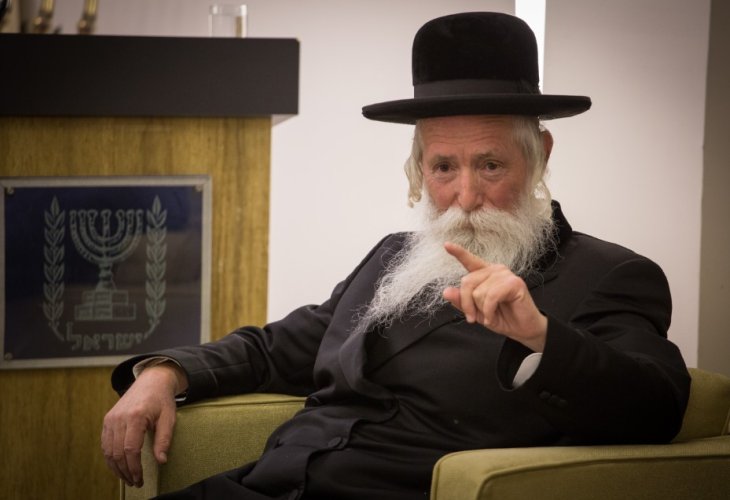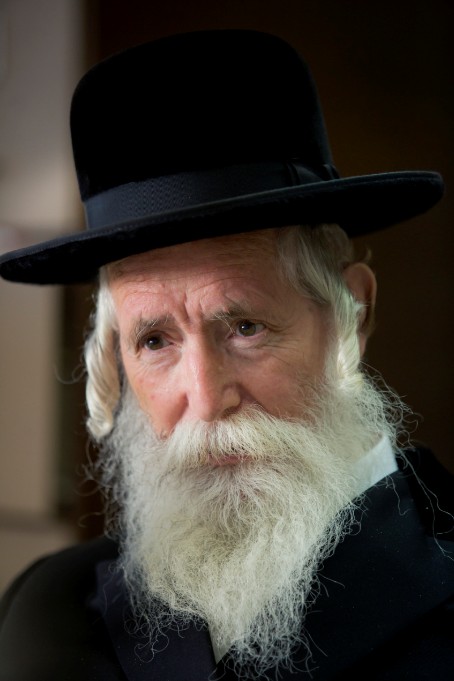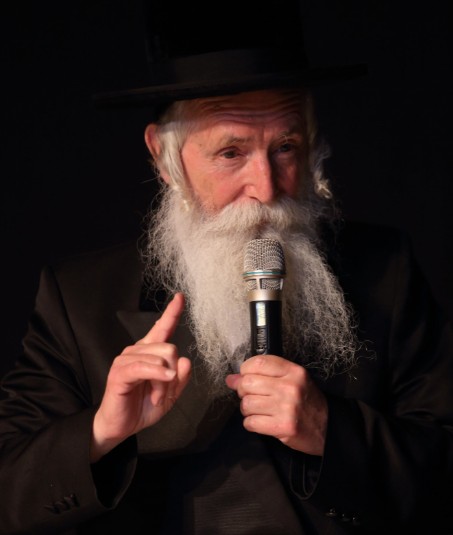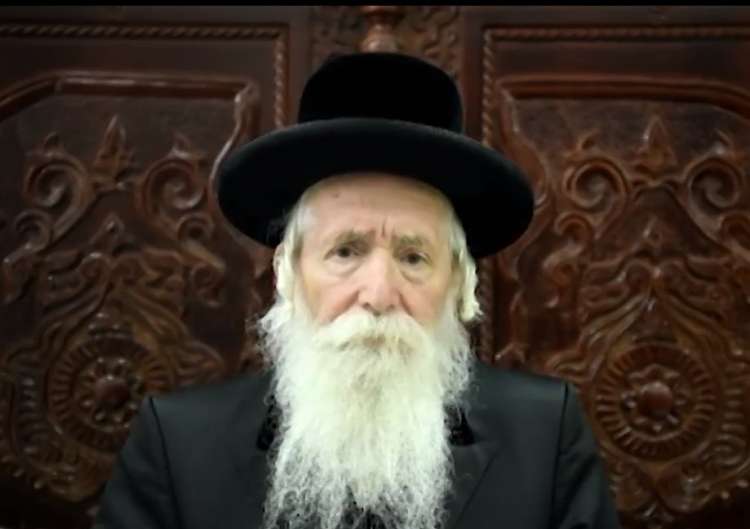Rabbi Grossman: "Do Not Abate, Hashem Wants Us to Cry Out to Him"
Millions in distress, Hashem is awakening us, shaking the world, He wants to hear us cry out to Him: 'Bless us, our Father, all as one.' When a father sees his children united, it evokes his love for them, and then he has mercy on them," Rabbi Yitzchak Dovid Grossman in an emotional talk.
 Rabbi Grossman (Hadas Parush/Flash90)
Rabbi Grossman (Hadas Parush/Flash90)This man, who grew up in the Beit Vardash neighborhood, near Kikar HaShabbat – the 'Kasbah' of Orthodox Jews in Jerusalem – in a crowded house with two small rooms, a salon filled with books, and many siblings, seems to be well known to almost every Israeli. Rabbi Yitzchak Dovid Grossman comes from an interesting background in religious terms: His father was a prominent member of the Pinsk-Karlin Hassidim and a head of a yeshiva in the Chabad institutions, while his mother's side comes from Rabbi Yosef Zundel Salant, a founder of the Musar movement, among the old settlement in Jerusalem. This contrast has undoubtedly played a significant part in shaping his character: a symbol of unity between sectors in Israeli society over many long years.
 (Photo: Moshe Shai/FLASH90)
(Photo: Moshe Shai/FLASH90)
The Rabbi of the Discotheques
After his marriage, Rabbi Grossman moved to live in Migdal HaEmek, and in 1970 he was appointed as the chief rabbi of the place. His activities were not typical for a rabbi at the time. For instance, he would walk near the 'Brazil Boys,' enter discotheques and clubs filled with youth disconnected from Torah and religion, and speak to them. He recounts that he still remembers their astonished looks. It wasn't easy, but slowly, they grew fond of him. Initially, they danced together, and later found themselves far from there.
The scope of his activity is astounding by any standard: he founded the Migdal Ohr institutions with thousands of students who immigrated from the former Soviet Union; in 2003, he established the Or Israeli youth movement, which organizes about 9,000 young people in 130 branches across the country; he initiated the Holiday of Giving campaign, distributing tens of thousands of food packages before Passover and Rosh Hashanah; in 2011, he established a community academic center for the Haredi society, and in 2012 founded the educational-therapeutic youth village 'Kfar Zoharim.'
Despite his classic Orthodox appearance – hat and suit – as a descendant of a prestigious rabbinic dynasty he does not hesitate to visit prisoners in jails and demand a special religious wing be opened for them to maintain their way of life. He also occasionally travels to Hollywood, Los Angeles, to connect people and sectors.
Rabbi Grossman was awarded the Israel Prize for his extensive activities, but in 2003 he refused to submit his candidacy for the position of chief rabbi of Israel, even though the appointment seemed guaranteed. The reason was his father's refusal, supported by Rabbi Elyashiv, the leader of the generation back then, who probably opposed him taking an official state position and understood that his charity work was more important.
His relationship with soldiers is also interesting: During the Second Lebanon War, in 2006, Rabbi Grossman hosted 700 paratroopers who arrived in the middle of the night to the dormitories of the Migdal Ohr campus in Migdal HaEmek before they went out to battle. This story, of soldiers meeting a rabbi with a kippah and beard hugging them and wondering why he invites them to the pool instead of offering to lay tefillin, is one he often tells.
It is no surprise, therefore, that his wide and long-standing familiarity with Israeli society causes him to sound very relevant today, in 2020, when discussing current events.
"We Are the Hope of the World"
Take, for example, the burning issue of today: the coronavirus pandemic. In a conversation with him, it turns out that the rabbi himself entered isolation twice.
During a visit to the Western Wall, the rabbi encountered a couple supposed to get married and due to new guidelines had to cancel the hall and many guests, settling for a celebration with ten people on a roof facing the Wall. They asked the rabbi to marry them, and he gladly agreed.
"Just a short while ago, at the start of the pandemic, we read the portion of Vayakhel-Pekudei. It addresses a plague situation that came after the sin of the golden calf. Amidst this terrible situation, Moshe gathers the people, and the Torah says 'Vayakhel Moshe,' meaning he actually unites the people in one place. According to the Midrash, this is not just so, but to show that when the Jewish people are united, it is hard to harm them."
Another point the rabbi wishes to emphasize at this time is Shabbat: "Moshe talks to them specifically then about Shabbat," he says with emotion, "because Shabbat protects the Jewish people. All blessings above and below, everything depends on Shabbat. This state of observing Shabbat shows faith and trust in Hashem that everything is from Him. Hashem wants to hear from us, for us to cry out to Him. It's like it says 'And Hashem remembered Rachel and heard her,' it is an amazing thing. Hashem essentially wants to hear Rachel's prayer. He desires the prayer of the righteous. So, too, we are in today's terrible state. Hashem wants us to cry out to Him. To strengthen ourselves in this.
"A few days ago was the yahrzeit of my father. He always liked to quote the words of Zohar about what we sing in 'Lecha Dodi' during Kabbalat Shabbat, 'Arouse yourself, rise from the dust.' It talks about a state where the Jewish people are like a chicken. If one tries to clean the dirt from it and touches the feathers, they will surely get hurt. Therefore, the chicken shakes itself, and thus cleanses. So too the Jewish people, if Heaven forbid they don't return on their own, it comes in a difficult way".
The rabbi wishes to clarify that this is not merely about the salvation of the Jewish people but a much broader role: "We are the hope of the world," he emphasizes.
 (Photo: Yaakov Naumi/Flash90)
(Photo: Yaakov Naumi/Flash90)
"We Need Unity"
These days, after three stormy election campaigns that have caused division and rifts among the people, and in the face of the coronavirus pandemic and national emergency, unity is noticeable among the people and even in the government, and according to the rabbi, this is what will bring the solution. Although he hints at his words to avoid political labeling and to maintain his connecting and inclusive character, his position is clear.
Just before Passover, he sent, along with three other prominent figures in Israeli culture – Miriam Peretz, the beloved singer Idan Raichel, and former Soviet prisoner and MK Natan Sharansky – an unusual letter to Prime Minister Netanyahu and his political rival, MK Benny Gantz.
"We, lovers of the people and the land, citizens of the State of Israel, turn to you requesting that you act with all your might for unity among the people. Unity in leadership. We do not speak for ourselves but on behalf of the people of Israel yearning for their leaders to be united, as we, as a nation, want and must remain united.
"The challenging health and economic reality, alongside the division among the people, necessitates us to join hands, unite, and lead Israel to safety. It is a time of trouble for Israel, and your hands are full of work, yet we are asking to meet with you urgently, even today, and to raise the voice requesting unity in Israel".
What caused the rabbi to deviate from his custom and intervene in the political sphere?
"It is not a political matter; we need to unite at this time. The Jewish people are one. There is no such thing as leftist, rightist, Ashkenazi, Sephardi, religious, secular. We are all one. A father who sees his sons loving one another gives up on the negative things. The moment we are united, we will receive the blessing. Mutual responsibility creates contentment. We see that during King Ahab's time, who was an evil king, even though there was idol worship, when the Israelites were united, they succeeded wherever they were. When Israel is one, we will come out of all troubles."
Another of his activities that combines Torah and unity is writing a Torah scroll. "We invited people from all over the world to a special initiative called 'Torah of Hope.' Everyone is uniting to merit healing and protection in these uncertain times, when the world yearns for salvation. We know that prayer, repentance, and charity transform a harsh decree into a good one. The Torah includes love, compassion, and care for all. Therefore, we want this to be a Torah scroll for everyone, and it will be lent to groups and communities across Israel who wish to use it.
"Additionally, usually we provide food for more than 25,000 needy families and elderly throughout the country, but this year, due to tens of thousands of unemployed, we are making a great effort and enhancing the annual aid campaign of Migdal Ohr, working with soldiers and volunteers in packing and supplying food around the clock."

"Hashem Shows Us He's in Charge"
Finally, the rabbi shares an emotional personal story from his family, which also deals with Shabbat observance, the Land of Israel, and an epidemic: A century ago, the malaria epidemic raged in the colony of Mishmar HaYarden and in the settlements of Yesod HaMaala and Rosh Pina, claiming many lives.
The dire economic situation of Rabbi Grossman's grandfather, Rabbi Zalman Grossman ztz"l, who lived in Jerusalem, forced him to leave the country for a few years to find a livelihood in the United States. He borrowed money to buy a travel ticket, parted from his family, and set out on the long journey.
"One thing that characterized him greatly was the observance of Shabbat at all costs," Rabbi Grossman recounts. "He almost did not sleep on Shabbat, because he said it was a waste to sleep on such a day. He would pray, learn, say Tehillim, and engage in Torah as much as possible.
"Even when my grandfather was on the ship, he ate and drank, sang the hymns, and prayed all of Shabbat. He was on deck all the time, even late at night. There was someone there who watched him with amazement all the time without saying a word. On Motza'ei Shabbat, he approached him and introduced himself. He said he had followed him all of Shabbat and was amazed by his devotion to Shabbat observance. The man eventually identified himself – it was none other than Baron Rothschild himself."
The baron offered Rabbi Grossman's grandfather help in anything, and the grandfather, who had set out to provide for his wife and children, did not hesitate and asked the baron to send help to the colonies, which were in distress. "He remembered that before he traveled, when he met his brother, who was also an Orthodox rabbi, a founder of Yesod HaMaala, he asked him to assist them urgently and send money to deal with the epidemic, and that was on his mind when he stood before the baron.
"And so it was," Rabbi Grossman relates, "the baron was motivated and assisted. He sent medicines, vaccines, doctors, food, and equipment. After a few days, my grandfather received a moving letter from his brother describing what had happened. 'One morning, teams of doctors and nurses arrived in our area with trucks loaded with medical equipment. They opened three pharmacies here supplying medicines to the sick, and injections were given as needed. The impact was immediate. Improvement was clearly visible, and indeed the epidemic stopped. We are full of gratitude to Hashem for this sudden change'.
"What is amusing is that at the end of the letter, he writes to his brother that there is a rumor that Baron Rothschild is behind this rescue operation. He writes to him that Hashem took care of them through his faithful messengers, and now he can take care of himself.
"We hear severe instructions from the authorities," Rabbi Grossman concludes our conversation, "and of course, one must listen to the government and the Ministry of Health's instructions – to be isolated. Not to walk together. Not to hug. Not to kiss. Not to shake hands. To keep distance," but he says one should not remain only in this realm to rise above the situation: "Look where we have reached! Understand what reality we are in! In the difficult situation we are in, Hashem is essentially showing us that He is in charge of the world."
"The entire world is shut down because of a virus that no one knows exactly what it is or how big it is. You can't travel. Move almost. America, Russia, Europe, China the Great. Everything is collapsing. Billions are being lost. People are paralyzed in their homes. Usually, there are 350 active planes worldwide, and suddenly everything is quiet. Now the question is, what do we hear in this silence."
"Even Pharaoh's magicians knew to say 'This is the finger of Hashem,' recognizing Hashem. Millions of people in distress. Hashem is awakening us. Shaking the world. He wants to hear us crying out to Him: 'Bless us, our Father, all as one.' When a father sees his children united, it evokes his love for them, and then he has mercy on them. Therefore, he also tells them to observe the Shabbat. If everyone strengthens personally, both in observing the Shabbat and in the unity of Israel, we will succeed."
Published in "Olam Katan"

